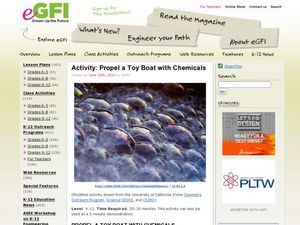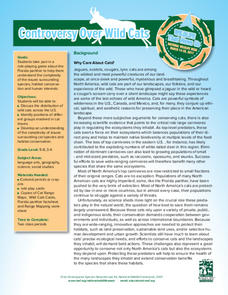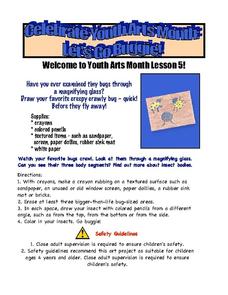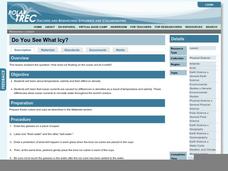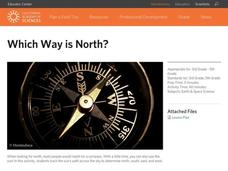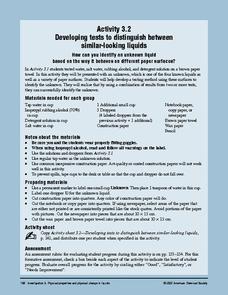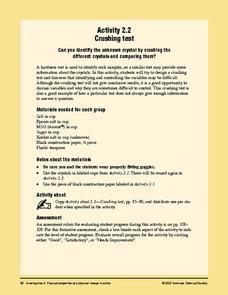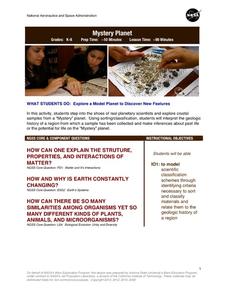Curated OER
Propel a Toy Boat with Chemicals
A simple cardboard or plastic boat is propelled across the surface of water when the surface tension is disrupted by adding detergent. Once youngsters see this in action, explain about the properties of water that make it possilbe:...
National Wildlife Federation
Controversy Over Wild Cats
Everyone should take an interest in the fate of wild cats. A thorough instructional activity explores the habitat changes of native North American wild cats and asks learners to make connections to human development. They consider the...
National Wildlife Federation
Bison Mystery Box
Natural design is amazing. Young scientists connect the features of a bison to an assortment of everyday items. A bison's tail is an ideal flyswatter, and a pot stores water just like a bison's stomach. The lesson connects the usefulness...
National Wildlife Federation
The Pollinator's Journey: Grades K-8
Bees get all the attention, but so many more creatures contribute to pollination. Scientists explore the role of pollinators as they learn about the parts of a flower and how it reproduces. They discover how plants rely on many different...
National Wildlife Federation
How Do You Feel About Water?
Less than one percent of the water on Earth is usable in people's homes. As pupils consider this fact, they reflect on their own water usage before designing a survey to collect information on water usage by others. They then analyze...
National Wildlife Federation
Danger from Afar: Non-Point Source Pollution and the Lake Superior Basin
How prevalent is pollution in the water system? A hands-on activity focuses on one area that is prone to pollution. Learners use game chips to represent clean water and polluted water and complete an activity that demonstrates how...
National Wildlife Federation
Watershed Web: A Field Trip
Observing plant succession doesn't have to be a decade long process. A hands-on lesson has groups study succession over a designated space. Learners use their observation skills to record differences in plant and soil characteristics in...
Curated OER
Exploring Owls
What can young scientists discover from dissecting an owl pellet? Explore the owl food chain, beginning with an introduction to these predatory birds. Suggested strategies here include creating a podcast and purchasing a poster, however...
Arts & Humanities
Let's Go Buggie!
To celebrate art youth month, little ones get out the magnifying glasses and get close-up with bugs. They make scientific observations of bugs you bring into the classroom. Then, they use markers, clay, paint, or crayons to make artistic...
Curated OER
You are the Archaeologist
Kids can practice their observation and evidence-based argument skills with a fun and engaging look at artifacts. With a given set of objects, each child will sketch and describe the object, then partners work together to determine...
Global Change
Impact of Climate Change on the Desert Pupfish
A fish that lives in the desert? You and your class can meet the desert pupfish as they examine its habitat, the role humans play in diminishing water supplies, and how climate change might impact this fishy friend. There are four short...
ARKive
Animal over Winter
Gosh those polar regions can get cold. So, how do the animals that live there survive the long winters? Learners explore how animals adapted to survive harsh wintry conditions by completing a worksheet and comparing animal survival...
Polar Trec
Do You See What Icy?
Here is a lesson that kicks off with a question. "How does ice floating on the ocean act as it melts?" As learners investigate this natural phenomenon, they'll discover that it has a lot to do with temperature, salinity, and the effect...
Baylor College
Water in Your Body
Do you know how much water you have had in the last 24 hours? Do you know how much your body needs? In this hands-on activity, your class members will estimate how much water our bodies lose each day by filling and emptying one-liter...
Florida Department of Environmental Protection
Build Your Own Aquifer
Ever wondered how an aquifer works? Introduce your class to the amazing way many people get water by exploring how underground aquifers work. Two fun hands-on activities are used to help kids understand what an aquifer is, how it works,...
California Academy of Science
Which Way is North?
Who needs a compass to find cardinal directions? Just place a stick in the ground and record the movement of its shadow over the course of a day. Then, measure the shadow lengths in order to determine a north-south line. A simple...
Curated OER
Connect the Spheres: Earth Systems Interactions
Is everything really connected? Take your class on a walk outside, where they will make observations and write them down on a worksheet. Once they are back in the classroom, learners will work to determine if and how things like birds,...
Curated OER
Spider Safari
Today we are talking about one of the stealthiest, sneakiest, and most intriguing insects of all times, the spider. Learners will examine the predatory nature of these super bugs as they conduct a spider safari survey. Each child will...
American Chemical Society
Developing Tests to Distinguish Between Similar-Looking Liquids
Each group talks about how to test unknown liquids based on their findings in the previous experiment. In this second of four activities, they test unknowns on wax paper, newspaper, and construction paper. As a stand-alone, this activity...
American Chemical Society
Crushing Test
Solidify understanding of the properties of crystals by crushing them to compare hardness. After some class discussion, a procedure is planned, and then small groups go about making observations as they crush five different crystal...
American Chemical Society
Exploring Baking Powder
Meant to follow an activity in which young chemists identified an unknown substance by chemical reactions, they now take their data and use it to determine which materials combine to make up baking powder. This lesson is one that can be...
NASA
Rover Races
Operating a vehicle remotely can be difficult, especially when the vehicle is on another planet. Young engineers get a feel for some of the real-world challenges as they work to program their rovers (blindfolded group members) through an...
NASA
Mystery Planet
What can one learn about a planet based on a small surface sample? Learners will explore artifacts from a mystery planet and see what they can determine about the planet based on the evidence in front of them.
Chicago Botanic Garden
Albedo, Reflectivity, and Absorption
What is reflectivity, and what does it have to do with the Earth's climate? As reflectivity is measured by albedo, scientists can gather information on Earth's energy balances that relate to global warming or climate change. Budding...
Other popular searches
- Earth Science
- Physical Science
- Life Science
- Science Project
- Science Space
- Environment Science
- History of Science
- Environmental Science
- Pe Science
- Family and Consumer Science
- Consumer Science
- Social Science


